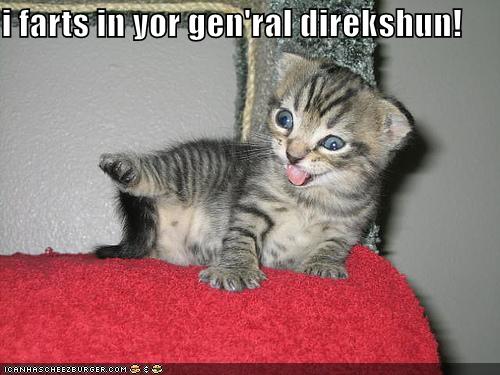At first, I mistook this look as disdain for the act itself. A dog would never judge me like that, but from a cat I've grown to expect it. After a moment's reflection, however, I realized that what I was looking at was bitterness, a bitterness born of the realization that what I had just done was something that she herself could not do, for while she may participate half way in such a release, she will never know what it is to announce its coming with the fanfare that I had.
For, as a cat, she lacks butt cheeks.
Think on this now, dear reader, for I believe this may be one of the key reasons for the bitterness felt by many of our fellow species in the animal kingdom against us. As we have been blessed with cheekage, we tend to take those cheeks for granted, never considering what it would be like to have to live without them, never knowing what it was to possess the musical abilities that come so naturally with such padded appendages. Animals like cats have to try and target their releases for effect, whereas for human beings that is merely a choice we can make from a vast repertoire of more tumultuous possibilities.

Why do I think this may be a source of bitterness? Well, let's think about animals that attack people, such as cats. Any cat, of any size, lacks the propensity for the above described symphonic shenanigans. Similarly, bears, wolves, sharks (who are further suppressed by the water, but could presumably still be taunted by what must be the extreme aquatic squeaking that would result from the forced clench of a wetsuit), wolverines, spiders, snakes, venomous ducks, etc. all must apply the tag "silent but deadly" not just to their stalking, but to their expellation of gas as well.
Now let's look at animals that, instead, have a history of not just non-violence, but an actual working relationship with man. Take horses for example. For hundreds of years, horses and men have worked together. We ride them, they pull carts, they shill beer for us; all sorts of things we, as humans, appreciate. And what do horses have in common with us? Huge, glorious butt cheeks, greater even than our own, with more sheer trumpeting power. Seriously, I haven't spent a lot of time with horses, but they never miss the opportunity to show off how much more boisterous their releases can be than our own (well, that and, you know, the other thing they like to point out that they've got over on us men).

Now, I'm not ready to begin writing a thesis on this or anything. Right now, I'm just exploring the idea, keeping an eye out for evidence to support my theories. I'll have to watch more Animal Planet to build up my case (although now that I think about it, last night it was lions attacking gazelles, which is more non-cheek on cheek violence - fascinating). In the meantime, I'll have to keep an eye on that cat. She still has some claws, and I'd hate for my posterior to become a target of her pent up rage.
1 comment:
I too have cats that are jealous of the notes I can produce with the ombasure that me cheeks allow, for their balloon-knots can only muster a whisper.
Post a Comment